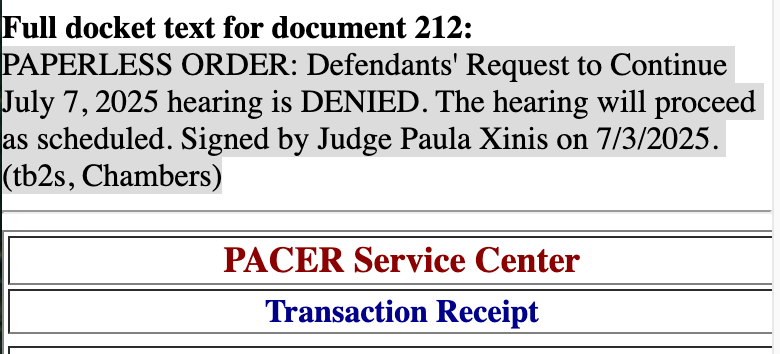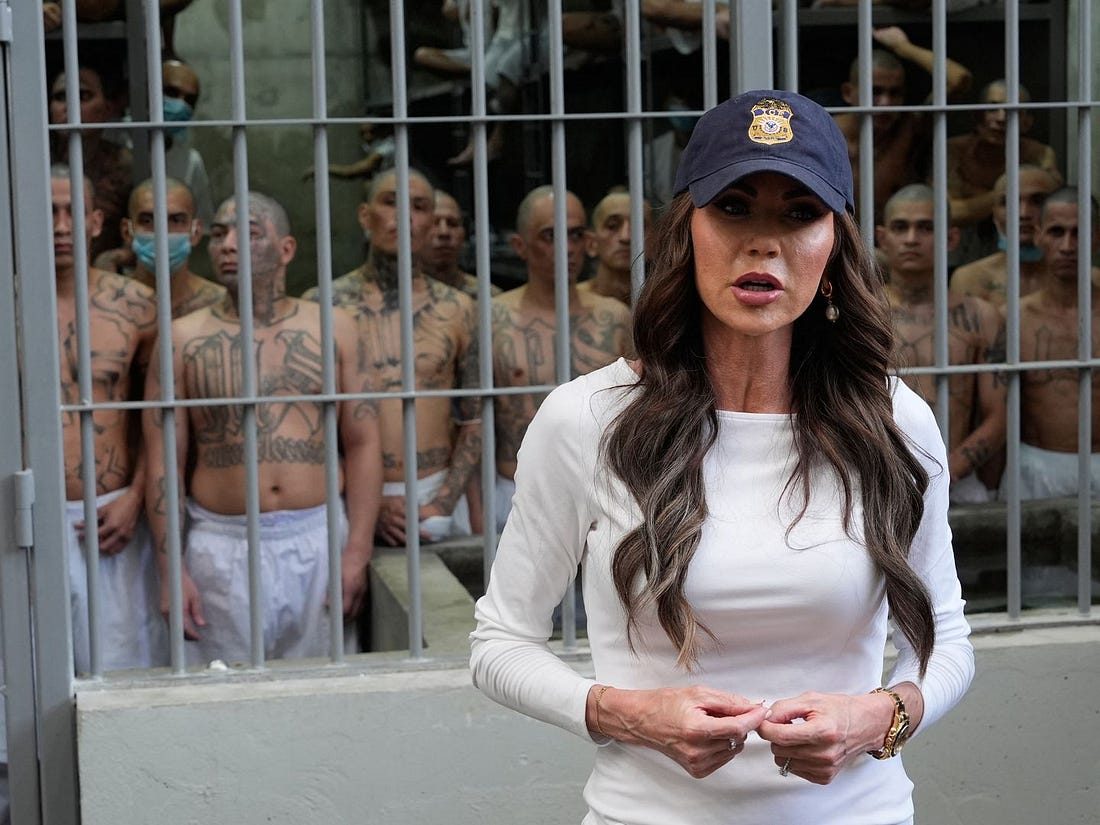The Civil Case On March 24, 2025, Kilmar Abrego Garcia’s wife filed a civil lawsuit on his behalf in federal district court in Maryland. The defendants included Attorney General Pamela Bondi, DHS Secretary Kristi Noem, and Secretary of State Marco Rubio. The Trump administration had just deported Venezuelans it claimed were gang members to El Salvador, although ultimately it came to light that significant numbers of them weren’t. The Trump administration violated a district court’s order that the men not be turned over to El Salvador, which was ultimately reversed by the Supreme Court. It’s not unusual for plaintiffs in civil cases to amend their initial complaint as new information comes to light. On Wednesday, Jennifer Stefania Vasquez Sura, Abrego Garcia’s wife, asked the court for permission to do so. She explained that “the Government filed a motion to dismiss Plaintiffs’ Complaint as moot, arguing that because it had returned Abrego Garcia to the United States, Plaintiffs have received all the relief they sought.” She wanted to amend her complaint to “clarify that the relief they seek remains live, notwithstanding Abrego Garcia’s return to the United States.” Three new items are included in the amended complaint:
The proposed amended complaint, which is attached to the motion for permission to file it, contains predictable but still shocking revelations about conditions at CECOT. The conditions, as alleged, are more like a concentration camp than a prison in the United States, and there is little doubt that if established, the allegations made about those conditions would run afoul of the Constitution’s prohibition on cruel and unusual punishment. Although the government has maintained that once delivered to El Salvador, these men are no longer in U.S. custody, that argument is paper-thin, or at least it should be, since the U.S. government is paying El Salvador to house these men. The allegations made by Abrego Garcia will likely play prominently in litigation over this issue. The new allegations in the amended complaint include the following: “Upon arrival at CECOT, the detainees were greeted by a prison official who stated, ‘Welcome to CECOT. Whoever enters here doesn’t leave.’ Plaintiff Abrego Garcia was then forced to strip, issued prison clothing, and subjected to physical abuse including being kicked in the legs with boots and struck on his head and arms to make him change clothes faster. His head was shaved with a zero razor, and he was frog-marched to cell 15, being struck with wooden batons along the way. By the following day, Plaintiff Abrego Garcia had visible bruises and lumps all over his body. In Cell 15, Plaintiff Abrego Garcia and 20 other Salvadorans were forced to kneel from approximately 9:00 PM to 6:00 AM, with guards striking anyone who fell from exhaustion. During this time, Plaintiff Abrego Garcia was denied bathroom access and soiled himself. The detainees were confined to metal bunks with no mattresses in an overcrowded cell with no windows, bright lights that remained on 24 hours a day, and minimal access to sanitation.” And although the complaint alleges that El Salvadoran prison officials acknowledged that Abrego wasn’t a gang member, they threatened him with physical harm at the hands of gang members in the prison: “As reflected by his segregation, the Salvadoran authorities recognized that Plaintiff Abrego Garcia was not affiliated with any gang and, at around this time, prison officials explicitly acknowledged that Plaintiff Abrego Garcia’s tattoos were not gang-related, telling him ‘your tattoos are fine.’ While at CECOT, prison officials repeatedly told Plaintiff Abrego Garcia that they would transfer him to the cells containing gang members who, they assured him, would ‘tear’ him apart. Indeed, Plaintiff Abrego Garcia repeatedly observed prisoners in nearby cells who he understood to be gang members violently harm each other with no intervention from guards or personnel. Screams from nearby cells would similarly ring out throughout the night without any response from prison guards on personnel. During his first two weeks at CECOT, Plaintiff Abrego Garcia suffered a significant deterioration in his physical condition and lost approximately 31 pounds (dropping from approximately 215 pounds to 184 pounds).” During a conference call with District Judge Paula Xinis in Greenbelt, Maryland, the government acknowledged it intended to deport Abrego Garcia again, this time to a third country. That would not violate the withholding order that prevented them from sending him to Venezuela. The government’s lawyer represented that it didn’t have imminent plans for deportation, but Abrego Garcia's lawyers told the court, “We have concerns that the government may try to remove Mr. Abrego Garcia quickly over the weekend, something like that.” They asked for an emergency order that would bring him to Maryland if he were released in Tennessee, where he is facing the criminal charges the government filed against him when they returned him from El Salvador. Abrego Garcia remains in federal custody in Tennessee while the Magistrate Judge considers whether to release him—she previously ruled he was entitled to release, but she was concerned about the deportation issue. Judge Xinis set a July 7 court hearing in Maryland to discuss the emergency request and other matters. Today, she rejected the government’s request to delay the hearing to a later date. The same week Abrego Garcia’s wife filed her original complaint, Defendant Kristi Noem traveled to El Salvador to “visit” CECOT prison. She posed for this photo in front of a cell full of prisoners. A report from the CATO Institute suggests that although the government claims all of the men it sent to Venezuela are “illegal aliens,” in 50 of the 90 cases where they were able to identify how the men entered the United States, the men said that they entered the U.S. legally, with government permission, at an official border crossing point.” The Criminal Case The government attempted to save face when it returned Abrego Garcia from El Salvador by filing criminal charges against him involving the transportation of people who were known to be present in the U.S. without legal immigration status. Comments made by government officials went far beyond the facts alleged in the indictment—a clear violation of DOJ policy—in describing his conduct and claiming he was a serious violent criminal who, among other things, had sexually assaulted women. Last week, there were reports that the government’s key witness, Jose Ramon Hernandez Reyes, likely the owner of the car Abrego Garcia was driving during the incident he was charged with, was a three-time convicted felon. The deal the government cut with him allowed his early released early from federal prison to a halfway house in exchange for his cooperation in the case. An official with Homeland Security Investigations, part of ICE, testified Hernandez Reyes would have been deported but for his cooperation with the government. The Washington Post reported that he said in court that the government “is also likely to give him a work permit.” In the meantime, Abrego Garcia's attorneys have asked District Judge Waverly D. Crenshaw Jr. in Tennessee to enforce local rules that prohibit the Trump administration from making “extensive and inflammatory extrajudicial comments about Mr. Abrego that are likely to prejudice his right to a fair trial.” The motion continues, “These comments continued unabated—if anything they ramped up—since his indictment in this District, making clear the government’s intent to engage in a ‘trial by newspaper.’” Abrego Garcia’s lawyers raise four points of concern in their pleading:
In a normal administration, an Assistant United States Attorney who did any of these things would most likely be seriously sanctioned by internal DOJ disciplinary mechanisms. But here, the concern is about the Attorney General of the United States and other high-ranking officials. We are no longer surprised by much, but we should reclaim our ability to be shocked by the truly outrageous. Because that’s exactly what this is. It is the job of defense lawyers to put the government on its back foot. But they’ve made the claims in this case knowing that they will be thoroughly tested. In their motion, Abrego Garcia’s lawyers ask the court for a very simple sanction: they want him to “issue an order directing the parties to comply with Local Criminal Rule 2.01,” the local rule that prohibits these out-of-court statements. This afternoon, Judge Crenshaw directed both sides to stop making public statements about the case. It’s not clear from his two-sentence ruling, “Motion (69) is GRANTED. All counsel are expected to comply with the Local Rules of this Court,” whether the order extends to DHS employees in addition to DOJ employees, which Abrego Garcia’s lawyers requested. Despite this limited action, the motion was a strategic one that hints at the kind of arguments that will be used to argue a guilty verdict, if the government obtains one, should be reversed because the jury pool was tainted by the government’s own statements to the public. The motion also recites that, “The Vice President, a Yale Law School graduate, went so far as to flatly lie about Mr. Abrego, calling him a ‘convicted MS-13 gang member,’ notwithstanding that Mr. Abrego in fact has never been convicted of any crime at all.” Abrego Garcia’s lawyers are busy making a record. This case, which has brought issues of due process and the prospect of the executive branch of government ignoring orders issued by the judiciary to the forefront of Americans’ minds, will stand as one of the most important cases in American history. We don’t yet know how it will end. It is a very dangerous moment for our democracy, one we should all pay close attention to. Thanks for being here with me at Civil Discourse. Your support, and your paid subscriptions help me devote the time and resources necessary to this work. We’re in this together, Joyce You're currently a free subscriber to Civil Discourse with Joyce Vance . For the full experience, upgrade your subscription. |
Thursday, July 3, 2025
Update: Abrego Garcia's Civil & Criminal Cases
Subscribe to:
Post Comments (Atom)
Take down tasks with automation 👊
Ditch the busywork. Delegate to the bots. ͏ ͏ ͏ ͏ ͏ ͏ ͏ ͏ ͏ ͏ ͏ ͏ ͏ ͏ ͏ ͏ ͏ ͏ ͏ ͏ ͏ ͏ ͏ ͏ ͏ ͏ ͏ ͏ ͏ ͏ ͏ ͏ ͏ ...

-
17 Personal Finance Concepts – #5 Home Ownershippwsadmin, 31 Oct 02:36 AM If you find value in these articles, please share them with your ...





No comments:
Post a Comment